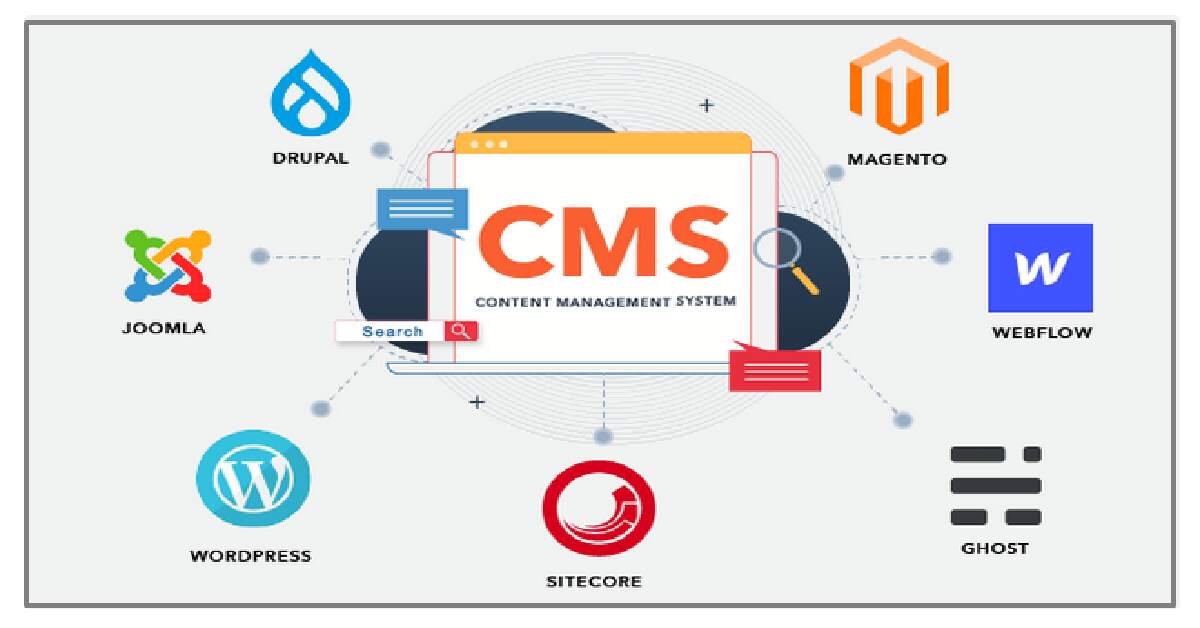Eye News Desk
আপডেট: ০১:৩৩, ১২ মার্চ ২০২৩
Content management systems (CMS)

In today's digital age, creating and managing content is a crucial aspect of running any successful online business or website. With so much content being produced every day, it can be a challenge to keep track of it all, especially if you have multiple authors or contributors. This is where content management systems (CMS) come in. CMS platforms are software applications that help businesses manage their digital content, allowing them to create, publish, and distribute content more efficiently. In this article, we will explore CMS platforms in more detail, looking at what they are, how they work, and some of the most popular CMS platforms available today.
What is a CMS?
A content management system (CMS) is a software application that allows users to create, manage, and publish digital content, usually in the form of text, images, videos, and other multimedia. CMS platforms are designed to make it easier for businesses to manage their content, whether they have a single website or multiple sites across different platforms. CMS platforms typically have a backend interface that allows users to create and edit content, while a frontend interface displays the content to the end-user.
The key benefits of using a CMS are that it simplifies the process of creating and managing content, saves time and resources, and provides a more streamlined workflow. CMS platforms also offer a range of features, including templates and themes, plugins, and widgets, which can be used to enhance the functionality and design of the website. CMS platforms are also highly customizable, making it possible to tailor them to the specific needs of the business or website.
How does a CMS work?
CMS platforms work by separating content from presentation. In other words, the content and the design of the website are stored in separate databases. This means that users can change the design of their website without affecting the content, and vice versa. The CMS platform acts as an intermediary between the two databases, ensuring that the content is displayed correctly on the frontend interface.
CMS platforms typically have a backend interface that allows users to create and edit content. The backend interface is usually accessed through a web browser, and users can add, edit, and delete content as needed. The frontend interface is the website itself, which displays the content to the end-user. The frontend interface can be customized using templates and themes, which change the design and layout of the website.
One of the key features of CMS platforms is their use of templates and themes. Templates and themes are pre-designed layouts that can be used to quickly create a website without having to build it from scratch. Templates are more basic and usually just include the layout and structure of the website. Themes, on the other hand, are more comprehensive and include not only the layout and structure but also the design elements, such as color schemes, fonts, and graphics.
Another key feature of CMS platforms is their use of plugins and widgets. Plugins and widgets are small pieces of code that can be added to the website to enhance its functionality. Plugins and widgets can be used to add features such as social media sharing, e-commerce functionality, and contact forms.
Popular CMS platforms
There are many different CMS platforms available today, each with its own unique features and benefits. Some of the most popular CMS platforms include:
WordPress
WordPress is the most popular CMS platform in the world, powering more than 40% of all websites on the internet. WordPress is an open-source platform, which means that anyone can use and modify the software for free. WordPress is known for its ease of use and flexibility, making it a great choice for beginners and experienced users alike.
WordPress has a vast library of templates and themes, which can be used to create a wide range of websites, from blogs and portfolios to e-commerce stores and social networks. WordPress also has a massive library of plugins, which can be used to extend the functionality of the website. There are over 58,000 plugins available on the official WordPress plugin repository, covering a range of categories, including SEO, security, social media, e-commerce, and more. Some of the most popular plugins include Yoast SEO, which helps optimize content for search engines, WooCommerce, which is a powerful e-commerce platform, and Jetpack, which provides a range of features, including site stats, security, and backups.
Another advantage of using WordPress is its ease of use. WordPress has a user-friendly interface that makes it easy to create and manage content, even for beginners. The platform is highly customizable, with a wide range of settings and options that can be tailored to the specific needs of the website. WordPress also has an active community of users who provide support and advice through forums, tutorials, and documentation.
In addition to its ease of use and customization options, WordPress is also highly scalable. The platform can handle a large amount of traffic and content, making it suitable for businesses of all sizes. WordPress is also highly flexible, with a range of hosting options available, including shared hosting, dedicated hosting, and managed WordPress hosting.
However, despite its many advantages, WordPress is not without its limitations. One of the main concerns with using WordPress is security. As the most popular CMS platform in the world, WordPress is a prime target for hackers and cybercriminals. To ensure the security of the website, it is essential to keep WordPress and its plugins up to date, use strong passwords, and implement security measures such as SSL encryption and two-factor authentication.
Another limitation of using WordPress is its potential for performance issues. WordPress can be resource-intensive, particularly if the website has a large amount of content or uses many plugins. To ensure optimal performance, it is essential to optimize the website, use caching plugins, and choose a reliable hosting provider.
Overall, WordPress is a powerful CMS platform that offers a wide range of features and benefits for businesses and website owners. Its ease of use, customization options, scalability, and flexibility make it a popular choice for many websites. However, it is essential to be aware of its limitations and take steps to ensure the security and performance of the website.
Benefits of using a CMS
The benefits of using a CMS are numerous, and they extend to businesses of all sizes and industries. Some of the key benefits of using a CMS include:
Simplifies content creation and management: With a CMS platform, businesses can create, edit, and publish content more efficiently. CMS platforms offer a range of features, including templates, themes, plugins, and widgets, which simplify the process of creating and managing content.
Saves time and resources: CMS platforms automate many tasks related to content creation and management, which saves businesses time and resources. For example, businesses can use a CMS platform to schedule content in advance, freeing up time to focus on other tasks.
Provides a more streamlined workflow: CMS platforms provide a more efficient workflow by allowing businesses to assign roles and permissions to users, track changes, and collaborate on content. This results in a more streamlined and efficient content creation and management process.
Offers scalability: CMS platforms are highly scalable, which means they can grow with the business. As the business expands and the content grows, the CMS platform can handle the increased workload.
Improves website performance: CMS platforms are designed to optimize website performance, which can improve search engine rankings, increase traffic, and enhance user experience.
Popular CMS Platforms
WordPress: As mentioned earlier, WordPress is the most widely used CMS platform in the world, with over 40% of websites using it. WordPress is an open-source platform that is known for its ease of use, flexibility, and massive library of themes and plugins.
Drupal: Drupal is another popular open-source CMS platform that is known for its scalability, flexibility, and security. Drupal is particularly popular among large organizations and government agencies.
Joomla: Joomla is an open-source CMS platform that is known for its user-friendly interface and extensive customization options. Joomla is particularly popular among small and medium-sized businesses.
Magento: Magento is a CMS platform that is designed specifically for e-commerce websites. Magento is known for its scalability, security, and extensive range of features and plugins.
Shopify: Shopify is another CMS platform that is designed specifically for e-commerce websites. Shopify is known for its ease of use, reliability, and extensive range of features.
Choosing the Right CMS
Choosing the right CMS platform can be a daunting task, particularly if you are new to the world of content management systems. When choosing a CMS platform, it is essential to consider your specific needs and requirements. Some of the factors to consider when choosing a CMS platform include:
Ease of use: If you are new to content management systems, it is essential to choose a platform that is easy to use and has a user-friendly interface.
Scalability: If you plan on expanding your business or website in the future, it is essential to choose a CMS platform that can handle the increased workload.
Customization: Choose a CMS platform that is highly customizable and can be tailored to your specific needs and requirements.
Features and functionality: Look for a CMS platform that offers the features and functionality you need, such as templates, themes, plugins, and widgets.
Support and community: Choose a CMS platform that has a strong support network and an active community of users who can provide assistance and advice.
This article is a comprehensive guide to content management systems (CMS). It begins with an introduction to CMS platforms and their importance in managing digital content. The article then delves into how CMS platforms work and their key features, such as templates, themes, plugins, and widgets. Finally, the article highlights some of the most popular CMS platforms available, with a particular focus on WordPress, which is the most widely used CMS platform worldwide. Overall, this article provides a detailed overview of CMS platforms and their benefits for businesses and website owners.
Conclusion
In conclusion, content management systems (CMS) are essential tools for managing digital content in today's digital age. With so much content being produced every day, it can be a challenge to keep track of it all. CMS platforms offer a range of features that simplify the process of creating, managing, and publishing content. They also save time and resources and provide a more streamlined workflow. CMS platforms are highly customizable, making it possible to tailor them to the specific needs of the business or website. With so many different CMS platforms available today, businesses and website owners have plenty of options to choose from, each with their unique features and benefits. Whether you are a beginner or an experienced user, there is a CMS platform that will meet your needs and help you achieve your digital content goals.
Read More
- আমেরিকান ডিভি লটারি ২০২৪ বাংলাদেশ
- ফেসবুক মনিটাইজেশন আপডেট ২০২৩
- বাংলাদেশে কম দামে ভালো মোবাইল ফোনের দাম
- অনলাইনে কানাডা ভিসা চেক করার নিয়ম ২০২৩
- মোবাইল নাম্বার দিয়ে লোকেশন বের করার নিয়ম
- অনলাইনে বিধবা ভাতা আবেদন করার নিয়ম ২০২৩
- সুন্দরবন কুরিয়ার সার্ভিস ডেলিভারি চার্জ
- পাসপোর্ট রিনিউ করার নিয়ম ২০২৪
- দৈনিক ৫০০ টাকা ইনকাম করার উপায় ২০২৩
- মৌলভীবাজারের যুবকের কৌশল উদ্ভাবন রেললাইন থেকে বিদ্যুৎ উৎপাদন









































